Failure to Thrive: Bridgerton, Anachronism, and Queer Potentials
Two months ago I started seeing rumors of a forthcoming ‘queer character’ or storyline on Bridgerton. I do not believe the show delivered, and have great concerns for forthcoming seasons.
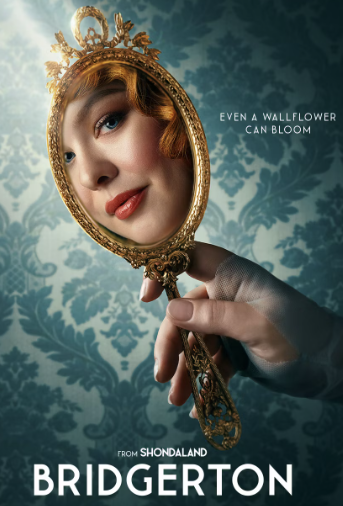
Two months ago I wasn’t yet caught up in the tidal wave of Bridgerton, but I was aware of the discourse starting online. Specifically, I started seeing rumors of a forthcoming ‘queer character’ or storyline in the show’s forthcoming season(s). Now, here’s the thing: the show is an adaptation of a series of Regency Romances, which means they follow specific genre patterns and take place during 1811-1820, the Regency Period. The television series is also part of Shondaland, and I have to admit I was a first-generation Grey’s Anatomy viewer at 14 years old in 2005, so it imprinted on me in a very specific dramatic storytelling sort of way. Because Grey's has been on air for so long, it offers a great point of comparison between the two shows under the Shondaland banner. In the nearly 20 years since Grey's Anatomy first aired, certainly queer potentials and the representation thereof has gotten better, right?
Look, I’m not furious or anything about season 3's second half, but I think we need to have a serious conversation about what is actually meant by positive, accurate representation. Because I have been devastated by this season of Doctor Who after the way it has been promoted as a queer triumph, and the second half of Bridgerton season 3 fell into similar patterns of expectation and failed potential.
So, allow me to parse out my queer reading of Bridgerton's three seasons, focusing especially on the season 3 finale which acts as a culmination of failed potentials paired with a catalyst to completely new narrative elements.
Benedict, Eloise, & Francesca Bridgerton
The siblings have a particularly close relationship, which is represented throughout the show through their solitary conversations outside at night. Both are behaving in ways they shouldn't when they have these nighttime meetups; Benedict is returning from a night of debauchery, and Eloise, a well-bred young lady, is alone and smoking. It is clear in these conversations both characters feel distanced from their siblings and the expectations placed upon them in some way.
Benedict, as the second son, will not inherit a title or responsibilities in that respect, but is incredibly wealthy and respected. Nevertheless, he struggles to find meaning, exploring a series of casual relationships throughout. In season one there is a brief scene where a man he has become friends with, and who has invited him to sexy parties, is seen kissing another man. This makes Benedict panic, and he removes himself from the situation. However, in season 3, the woman he has a casual relationship with introduces him to another man with whom he feels an instant chemistry. When they offer a threesome to Benedict, he once again panics. He spends time thinking about it, however, and returns to the couple, and we see our first m/m on-screen kiss.
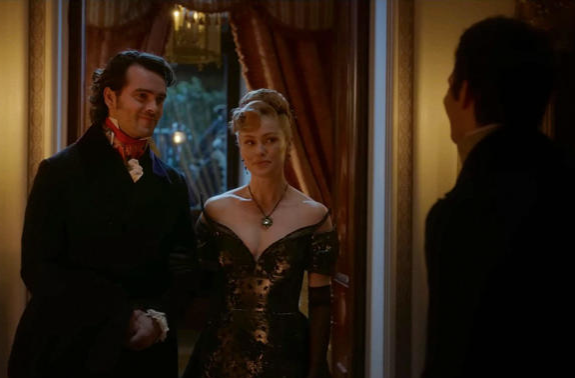
BUT, I think this is a brutally terrible sequence. First, Paul Suarez is introduced as one of Tilly's other casual lovers, fine. He also likes to sleep with men, which is why the invitation is extended to Benedict. He enthusiastically participates, and we even see after the...main event as it were, he returns to kiss Paul while Tilly looks on with what appears to be jealousy. This is supported when she later tells Benedict that she has feelings for him, so it's time to stop being silly and queer and settle down. It's what Benedict says in response which I feels makes the sequence especially egregious:
"I am not certain that serious is what I want. What happened between the three of us, what has happened ever since I met you, has made me realize how good it feels to be free. You have opened my world—and I am not ready to close it again just now."
The implication here is that the threesome, and Paul's role in it to a lesser extent, are incompatible with romantic feelings. Benedict wants to keep having fun the sort of which Tilly no longer wants to have; he associates the threesome, the m/m sex he hasn't had on his own before, with a pastime, something you do until you are ready to settle down, to develop feelings.
I'm not sure where they will go with this storyline in season 4, if at all. Certainly Paul is not part of Benedict's romantic life in the books. But, and this is what I go back to again and again, the show has already committed to an intense level of anachronism; it is already historically inaccurate. As an adaptation from a novel series, it is also impossible to maintain perfect fidelity to source material. Words and visual mediums simply function differently. Regardless, I don't care about fidelity to source material if it means being exclusionary in the creation of the new media. The books exist, and you can read them if you'd like. The show doesn't need to be exactly the same.
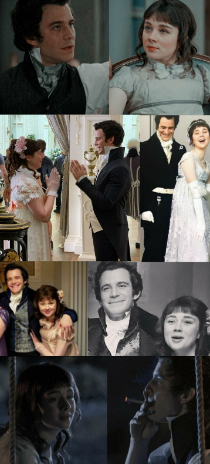
By extending Benedict in such a way, however, I read Eloise in a similar lens. Eloise, from the start, resists the future required of her. Planning to become a spinster with her best friend Pen, she has no interest in romance, courtship, or the gossip of the ton. Her reaction to the falling out she has with Pen, however, surrounding Pen's secret identity as Lady Whistledown, screams queer experience. She is devastated to learn that not only does Pen want a future husband, but that Pen has had feelings for Collin for a long time. This is where Eloise focuses most, and having been in Eloise's shoes, I can understand the devastation. She's learned the future she envisioned and desperately wanted wasn't wanted the same way by her other half. She immediately befriends Cressida, which I will discuss momentarily, and adopts different habits to fit in more closely with her and the other young women.
Keep in mind all of these young women are growing up incredibly isolated. They are not being educated about their own bodies, and compulsive heteronormativity is absolutely the norm. There's a great scene in season one between Violet Bridgerton and the eldest daughter Daphne, whose innocence at the time of her marriage did not serve her well, where they discuss this, I just wish the series would return to this idea in more than just Pen's comments at the end of season 3. Even a character like Francesca, whose lack of interest all season reads as remarkably Ace, recognizes her future is one wherein she will be married. Not because she wants to be, but because she is a young lady of good standing. She wants to marry a kind man who will let her keep playing her pianoforte, because that is what she cares about. I think Ace representation is vitally important to queer conversations, and would be beautiful if she remained that way, simply unengaged in the sexual conversations of the romance genre. Because that's the thing many cishet allosexual people forget, romance and having sex are different things. She tells her mother that she doesn't need the passionate love shared by her parents, there are other kinds of love with just as much value.
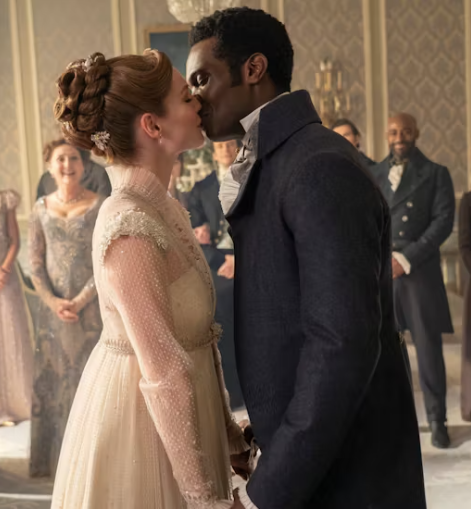
However, in the season 3 finale Francesca marries Lord Kilmarten. The camera lingers on her face after their first kiss and the disappointment writ large across it. And then she is introduced to her husband's cousin, the beautiful Michaela Stirling, and the poor girl loses her mind. Recalling the conversation she had with her mother earlier in the episode wherein Violet explains she lost the ability to speak upon first meeting her husband, Francesca can barely get a word out in introduction to Michaela. In the novels, Francesca ends up getting married again in the future, to Michael Stirling. The gender swap here could work well, but given what we've seen so far, I'm not holding my breath. My fear is we will get at least an episode, if not a season, of will-she/won't-she culminating in an extra-marital affair between Francesca and Michaela. This is pure speculation, of course, but speculation that comes from reading patterns of queer representation, and watching almost 20 years worth of Grey's Anatomy. Francesca's comments about love and its varieties would be clever to bring back here, or even Benedict's comments to Eloise when he tells her 'love is not finite,' despite discussing what is read by most as a platonic relationship. Love is love doesn't just mean romantic/sexual, you see.
I hope this will not be the case, and that Francesca can explore a F/F relationship in Season 4 without turning into negative queer stereotypes. But, given Eloise's decision to accompany her sister to the Scottish highlands at the end of season 3, there are a lot of queer doors which can be opened soon, and I'm worried about what direction they may take.
Cressida Cowper
Let's recap, this is a young woman without any social power, the only daughter of a man who only wants to marry her off to increase his own standing and a mother who cares more about maintaining her marriage than her daughter. All of these factors are not an uncommon experience, it's important to remember Bridgerton is showing an idealized, anachronistic, regency period. Beyond that, the Bridgerton family functions as the moral nexus of the narrative, those in opposition to the protagonists are of course villainous.
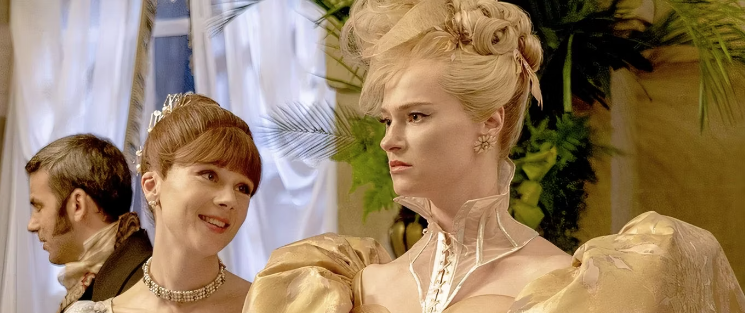
Eloise and Cressida become close after Eloise and Pen fall out; I, too, have had an intense rebound. The conversations Eloise and Cressida have often mirror conversations between other Bridgerton's and their future spouses, and Eloise uses the Calling Hour to visit Cressida at one point, properly attired to do so, and is violently removed from the house. Narratively, her father calls her "that Bridgerton girl," so the assumption remains the Bridgerton family, who have appeared in Lady Whistledown repeatedly, are not social peers. But this is in direct opposition to nearly everything else we see about the way the ton functions around the Bridgerton family. I think he is furious in the case because Eloise is behaving in a masculine role, using the socially approved flirting time to visit her friend. This is not the only time young women have to be with each other, but it is among the only times courting couples may spend time with only one or two chaperones.
When Cressida takes credit for being Lady Whistledown, it is perhaps not the brightest move. But she is exponentially vilified for trying to escape her fate, the same fate all the young women of the series have always expressed desperation to avoid: marrying a much older man. Season one goes so far as to show another character, Marina, go to extraordinary lengths to avoid such a fate given her pre-marital pregnancy. She isn't punished, however, and gets to marry Lord Crane at the end of her season. While she perhaps isn't happy in the way the protagonists get to be after their own marriages, she has the best possible future she could have hoped for.
Yet, Cressida remains increasingly vilified. She's not as intelligent as characters like Eloise or Pen, which shouldn't mean she deserves an ill fate, and she thinks of herself more than most other people, yet she still shows growth and concern regarding Eloise in this season. She genuinely cares about Eloise and Pen's falling out. These are not the actions of a purely selfish and evil woman, but of a young lady raised to be naive, trying desperately to find freedom for herself.
As Pen provides the summarizing speech for the season, she specifically touches more than once on the idea that for a woman, they do not have many options. Men like Benedict and Collin may do what they want, but women are so isolated they don't even know what they don't know. Pen, for all her lies and mistakes, is narratively forgiven. Her marriage to Collin becomes happy, and she even bears the first male child, meaning her son is the new Lord Featherington, raising her social status even more than when she married into the Bridgerton family. I'm not saying any of this to disparage Pen, I tihnk she is fascinating and female characters are not often given the grace to make extreme mistakes and recover from them. But if that grace is given to Pen, why not to Cressida? Cressida who is sent away at the end of the season to live with an elderly, if not also cruel, aunt in isolated Wales. She is literally shoved into the closet of a stagecoach at the end of the season.
Add in the fact that Cressida is portrayed by actress Jessica Madsen, one of the only openly LGBTQIA+ actors on the show, and I am extra uncomfortable with her character's treatment. Yes, actors are not synonymous with their characters, but there's a long history of queer actors being treated as lesser, more likely to be written off, etc. The energy given to Golda Rosheuvel and Jonathan Bailey, especially when the media made such a big deal about the introduction of queer storylines in this season, needs to be extended across the board.
Final Thoughts
There is, of course, the potential that season 4 will handle queer storylines with grace and dignity. Not every queer character has to be a heroic figure, but it's hard to make queer characters villainous or dynamic when the stereotypes are still so pervasive in our culture that life expectancies for LGBTQIA+ Americans are shorter than their cishet compatriots. In a show which already bucks historical accuracy in myriad ways, it wouldn't be difficult to work an established, accurate, positive queer romance into the narrative. There are three unmarried characters already present with strong queer identities, but we have to first accept that:
- There is no such thing as a "default" or "template" for characters before they are created
- Whether that's race, gender, sex, sexuality, age, appearance, etc.
- i.e. characters are not cisgender heterosexual white men until told otherwise. The assumption that there's a baseline that gets changed to be "diverse" is part of why this conversation is difficult.
- Seriously, try the Sims character generator for a while. If you just hit random, and it rolls dice to see things like skin tone and hair color, it is really difficult to randomly generate a blonde white person because on a planet of 8+ billion people, there's so much more than just Black and White. This is my example because it's more visual than queerness.
- Gay and Straight are not oppositive of each other and are not the only 2 options
- Queerness is not what you do for fun until you are ready to settle down
- "historical accuracy" is, first of all, not as cut and dried as it would seem, and also should not be more important than the safety of queer communities.
Finally, Lisa Fletcher contends 'tackling an idea of "history" is one of the first steps in recognizing and making sense of the performative force of the idea of heterosexual love.' She talks about "heterosexual drag" in historical romance novels, the idea that these characters dress up in heterosexual stereotypes. While she studied specific Victorian-era romances for her text, Regency romances hold overlapping potentials. She notes 'the nature of the relationship between a woman's body and her "performance," between her sex, her gender, and her sexuality, is a preoccupation which runs through this [historical romance] genre.' These are elements Bridgerton seems to touch on in the third season, especially as Eloise and Cressida are concerned. If you have interest in further reading of this kind, I found Fletcher's text incredibly useful:
- Fletcher, Lisa. Historical Romance Fiction: Heterosexuality and Performativity. Ashgate Publishing, Lmt., 2008.
Let me end with the highlight of season 3, for me. Some sisterly love between the Featherington girls culminating in this:
